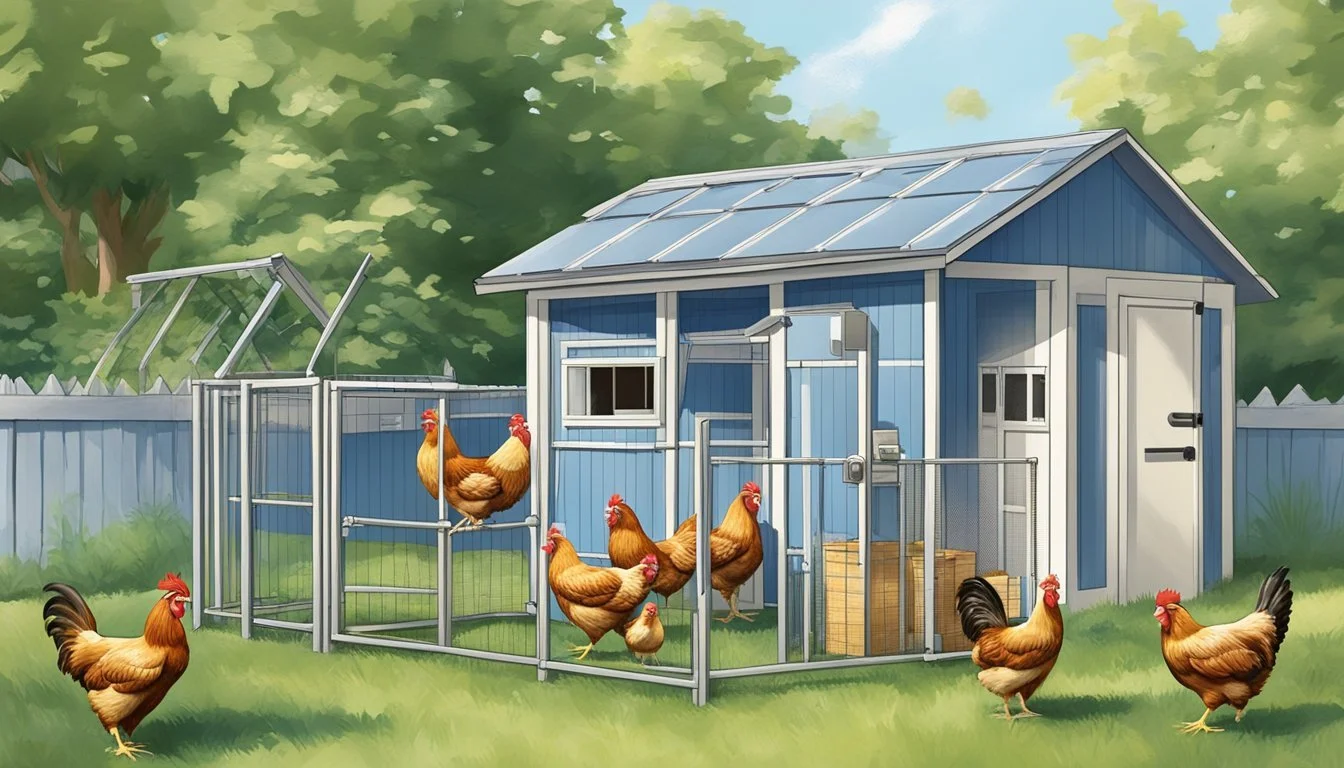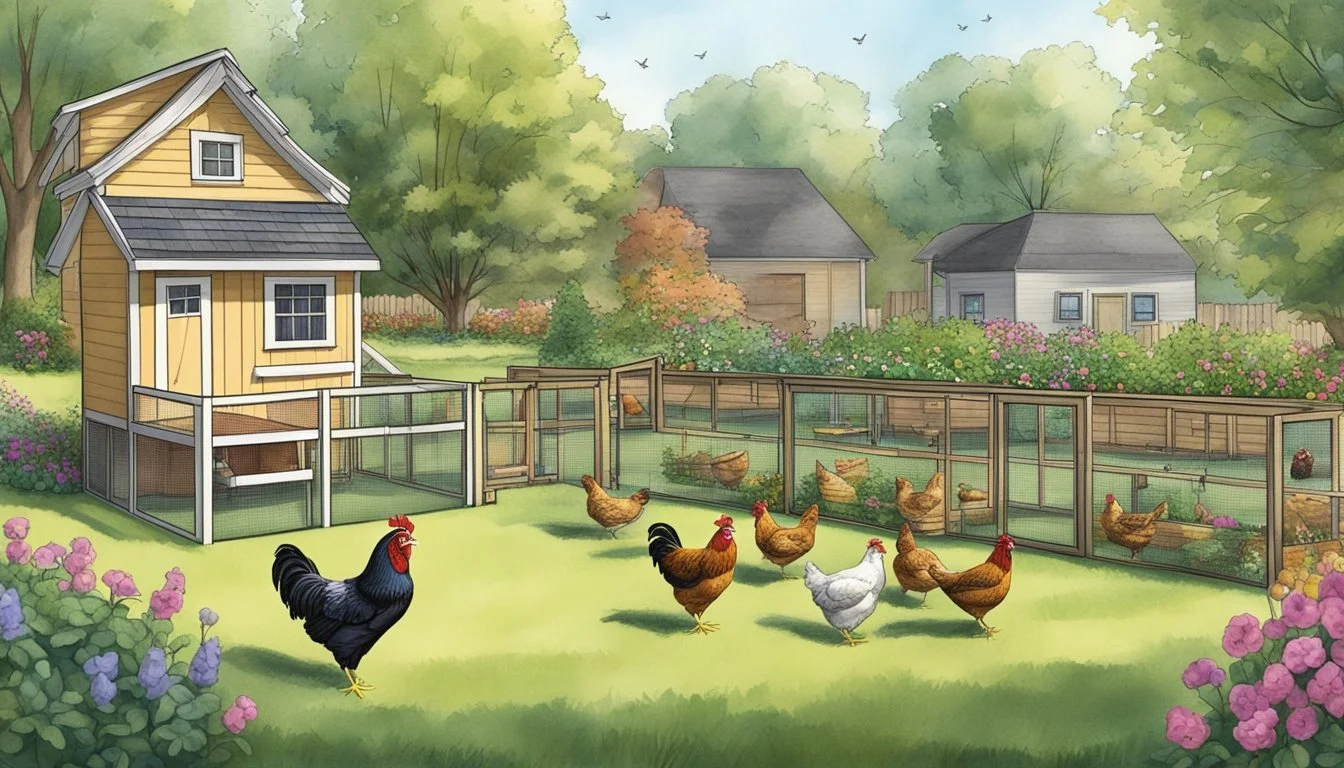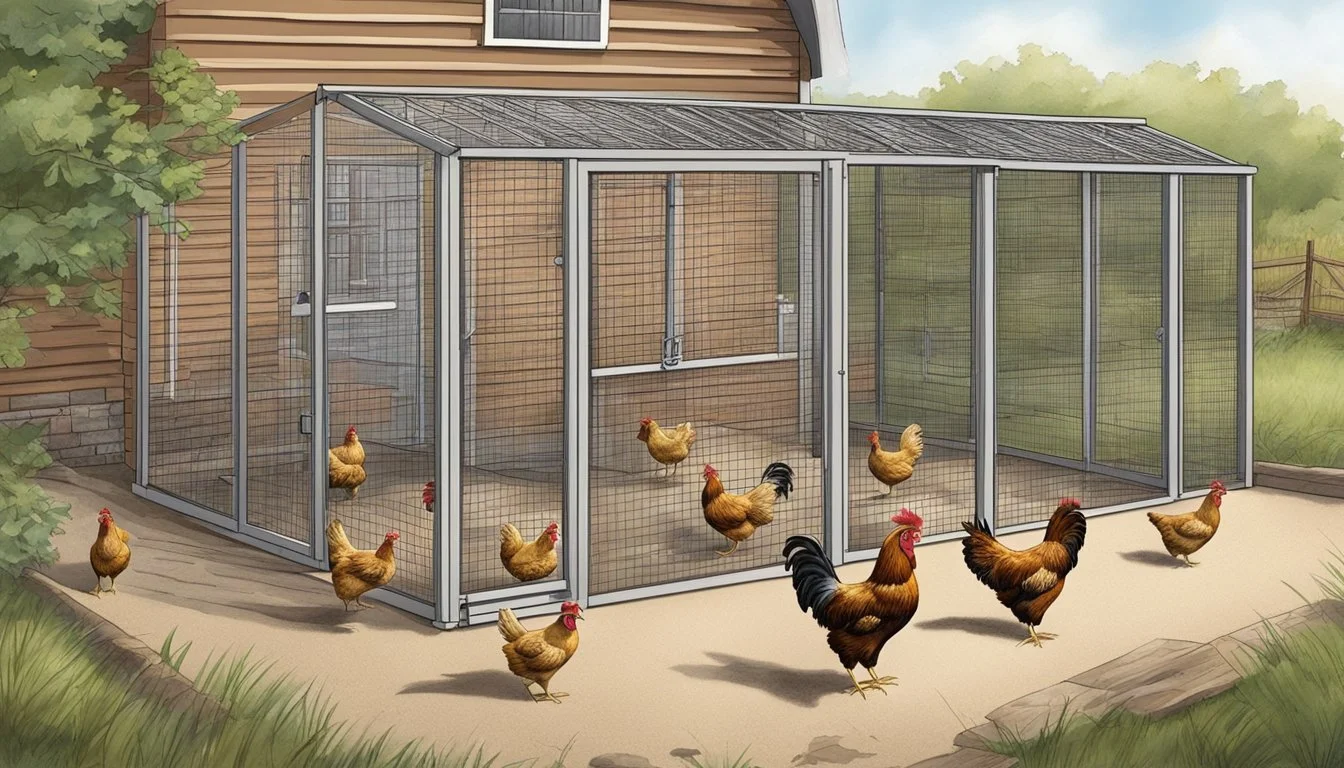Raising Backyard Chickens in Blaine, MN
Practical Guide for Beginners
Raising backyard chickens has become an increasingly popular practice in suburban areas seeking a more sustainable lifestyle, and Blaine, Minnesota is no exception. With suitable regulations in place, residents of Blaine can enjoy the benefits of having their own flock, from the provision of fresh eggs to the joys of animal husbandry. The city's ordinances allow residents in specific zoning districts such as RE (Residential Estate) and R-1 (Single Family) to keep chickens, subject to certain conditions aimed at maintaining community standards and animal welfare.
Navigating the regulations requires a clear understanding of Blaine's specific requirements for backyard poultry. Prospective and current chicken owners must adhere to local laws, which are designed to address a variety of factors including coop construction, the number of chickens allowed, and the management of potential nuisances like noise and odor. These guidelines ensure that while individuals enjoy the benefits of raising chickens, they also contribute positively to the local community and environment.
In Blaine, the path to raising backyard chickens begins with securing a chicken permit, which involves a straightforward process available through the city’s official channels. This step ensures that all potential poultry keepers are aligned with local standards, providing a foundation for the responsible and rewarding practice of raising backyard chickens. As the interest in backyard poultry grows, so does the importance of informed, responsible ownership to ensure the welfare of the chickens and the harmony of the community.
Understanding Local Chicken Laws in Blaine
In Blaine, Minnesota, residents interested in raising backyard chickens must be aware of specific local ordinances, zoning laws, and permit requirements that govern the keeping of such poultry.
City and State Regulations
City Council meetings in Blaine have led to the formulation of clear regulations regarding the ownership of backyard chickens. It is essential to understand that these rules are localized and residents must comply with the specific ordinances that Blaine, MN has established. Residents must maintain their chicken coops in the rear yard of their property, ensuring that they do not encroach on property lines, and respect the distance from adjacent and neighboring homes.
Zoning Laws: Chicken ownership is permitted as an accessory use in certain zoning districts such as Residential Estate (RE).
Roosters: The current ordinances do not allow the keeping of roosters to prevent noise disturbances.
Obtaining Necessary Permits
To legally raise chickens in Blaine, residents must obtain a Chicken Permit. The process requires an understanding of the city's specific requirements and compliance with all regulations set forth by the Blaine City Council.
Chicken Permit: Applicants must submit a Chicken Permit Application with the required fee of $45.
HOA Authorization: If the property is part of a Homeowners Association (HOA), additional authorization may be necessary.
Permit Verification: It is advised to call the city planning office at 763-785-6180 for zoning verification and to obtain the required registration form.
Residents must strictly adhere to the guidelines set forth while obtaining and maintaining a permit to raise chickens responsibly within Blaine, Minnesota.
Choosing the Right Chicken Breeds
When selecting chicken breeds for backyard flocks in Blaine, MN, the key factors to consider are the breed's ability to thrive in local climate conditions and their temperament. Egg-laying capacity is also a critical aspect to cater to the needs of the family.
Considering Climate and Temperament
Wyandotte and Orpington breeds are well-suited for Blaine's cold winters due to their hardy nature. Both breeds have a calm temperament, making them ideal for a family setting.
Wyandotte: Known for their good nature and thick feathers that provide insulation against the cold.
Orpington: Prized for their docility and heavy feathering, Orpingtons are both affectionate and able to withstand chillier temperatures.
Egg-Laying Capacities of Different Breeds
For families focused on egg production, understanding the egg-laying abilities of each breed is essential.
Ameraucana: Capable of laying approximately 3-4 eggs per week, they produce unique blue to green eggs, making them a favorite for backyard flocks.
Lohmann Brown: A breed not mentioned earlier but notable for its impressive output, laying over 300 eggs a year.
By selecting chickens that suit Blaine's climate and considering the preferred temperament and egg-laying capacities, families can create a thriving backyard flock.
Designing and Building a Chicken Coop
When building a chicken coop in Blaine, MN, it is critical to consider space requirements and protection strategies. Proper ventilation, security, and sanitation are essential for the health and safety of the chickens.
Coop Size and Space Requirements
The size of the chicken coop directly relates to the number of chickens intended for housing. As a general guide, each chicken requires at least 3-4 square feet inside the coop. For example:
6 chickens: 18-24 square feet required
10 chickens: 30-40 square feet required
Larger breeds or those who spend considerable time in the coop might need more space. Additionally, an outdoor run attached to the coop provides the chickens with more room to roam and exercise. This run should also offer ample space, with recommendations frequently suggesting at least 10 square feet per chicken.
Protecting Chickens from Predators and Elements
Security: To keep the chickens safe from predators such as raccoons, foxes, and birds of prey, the coop must be fortified. This includes using hardware cloth for windows and runs instead of chicken wire, which is more easily breached. All openings should be well secured with locks or latches that predators cannot easily open.
Ventilation: Proper ventilation is essential to prevent moisture buildup and to keep the air fresh inside the coop, reducing the risk of respiratory problems. Ventilation can be achieved through windows or vents placed high in the coop to allow for air flow without creating direct drafts on the birds.
Sanitation: For maintaining sanitation, the coop should be designed for ease of cleaning, including removable droppings trays. Regular cleaning prevents the build-up of ammonia and deters pests and diseases. Roof overhangs can protect the coop from the elements and prevent water from entering and exacerbating sanitation issues.
Daily Care and Maintenance
Raising backyard chickens in Blaine, MN requires dedication to a daily routine to ensure the wellbeing of the flock. Optimal care revolves around consistent feeding, water provision, and maintaining a clean habitat, crucial for the health and productivity of the chickens.
Feeding and Watering Your Chickens
Feed:
Chickens require a balanced diet comprised mainly of specially formulated feed, providing all the necessary nutrients.
Chicks: Starter feed is essential for the first 6 weeks.
Layers: At 18 weeks or when they start laying eggs, switch to layer pellets for optimal egg production.
Water:
Clean, fresh water must be available at all times, as chickens consume approximately three times as much water as feed.
In winter, ensure water doesn't freeze; using a heated waterer can be beneficial.
Keeping the Coop Clean and Sanitary
Cleaning Schedule:
Daily: Remove waste and leftover feed to prevent attracting pests.
Weekly: Change bedding and scrub waterers and feeders with soapy water.
Sanitation:
Implement deep cleaning monthly, with a thorough scrubbing of the coop and nesting areas.
Check for parasites regularly and treat with appropriate pesticides as advised by a veterinarian.
A well-maintained coop not only prevents diseases but also deters predators, assuring safety for the backyard flock. Proper hygiene practices are the cornerstone of successful chicken keeping.
Health and Welfare of Your Flock
Maintaining the health and welfare of your backyard chickens in Blaine, Minnesota, is essential for a productive flock. Properly managing diseases and implementing biosecurity measures can protect your chickens from common ailments and ensure their living environment promotes well-being.
Preventing and Identifying Illnesses
Chickens can be affected by various diseases and parasites, with symptoms ranging from respiratory distress to changes in behavior or appearance. Owners should be vigilant for signs of avian influenza, a contagious virus with symptoms such as high death rates and respiratory issues. Similarly, Salmonella presents a risk to both chickens and humans, characterized by diarrhea, fever, and abdominal pain. Early identification and immediate response are critical. The Minnesota Board of Animal Health should be contacted at 651-296-2942 in case of an outbreak of Highly Pathogenic Avian Influenza (HPAI).
Adequate ventilation is significant in the coop to prevent respiratory diseases. Chickens also require regular inspection to check for good feather conditions and signs of any parasites or mites.
Biosecurity Measures
Biosecurity is a series of measures designed to protect against disease entering or spreading within a poultry flock. Essential biosecurity practices for backyard flocks include:
Controlled access: Limiting exposure of your chickens to visitors and wild birds, which could carry diseases.
Sanitation: Regular cleaning and disinfecting of equipment and the coop.
Health management: Isolating sick birds and providing prompt veterinary care.
Predators are another concern for chicken safety, and measures should be in place to prevent attacks, such as secure fencing and coop enclosures.
By implementing these specific strategies, owners can significantly reduce the risk of illnesses and parasites, contributing to the welfare and longevity of their backyard chickens.
Managing Eggs and Egg Production
Effective management of eggs and egg production requires attention to detail and adherence to best practices to ensure a steady supply of fresh eggs. Backyard flock owners can optimize egg yield and maintain safety during storage and handling by following specific guidelines tailored to their flock's needs.
Maximizing Egg Yield
To maximize egg yield, one must ensure that chickens have a balanced diet that includes protein, vitamins, and minerals. A common diet includes grains, fruits, vegetables, and a source of calcium like crushed oyster shell for strong eggshells. Providing at least 16% protein in their feed is crucial for consistent egg production. Factors like breed, age, and light exposure also influence yield. It is known that hens require about 14 hours of light per day to lay eggs effectively, so supplemental lighting might be needed in Blaine, MN, especially during the shorter days of winter.
The typical egg production curve for chickens is as follows:
Initial Production: Starts ~19 weeks of age
Peak Production: Ranges from 90-95%
Decline: Gradual after peak, with reduced egg count each successive year
Storing and Handling Eggs Safely
When handling eggs, cleanliness and proper storage are imperative. Eggs should be collected frequently, at least once a day, to prevent spoilage and reduce the likelihood of breakage and contamination. After collection, eggs can be stored in a refrigerator at a temperature below 40°F (4°C) to maintain freshness. It is also advisable to store eggs with the pointed end down to keep the yolk centered and reduce air cell enlargement.
Egg Storage Checklist:
Clean eggs with fine sandpaper, a brush, or cloth
Refrigerate promptly at or below 40°F (4°C)
Store with the pointed end down
Do not wash eggs until ready to use to keep the natural protective coating intact
Fresh eggs can last up to 5 weeks in proper storage conditions, but for best quality, using them within 3 weeks is preferred. It is also worth noting that as chickens age, egg size can increase whereas shell quality may decrease, necessitating more careful handling of older eggs.
Understanding the Impact of Raising Chickens
Raising backyard chickens in Blaine, MN can affect the environment and the community. It is important to understand the possible environmental implications and how it interacts with community standards and regulations.
The Environmental Footprint
Backyard chickens can contribute positively to local agriculture by providing a sustainable source of eggs and meat. They reduce the necessity for transportation and packaging associated with store-bought equivalents, thus cutting down on carbon emissions and packaging waste. However, they also produce manure, which, if not managed correctly, can lead to unsanitary conditions and the emission of greenhouse gases such as methane and nitrous oxide. Effective manure management is essential, involving regular clean-up and composting to minimize odor and the risk of water contamination.
Community Considerations
In residential communities like Blaine, MN, the presence of chickens requires consideration of both neighbors and local bylaws. Chickens can be a source of noise, which may disturb residents, and regulations are in place to address this issue. Additionally, there is a need to prevent odor and unsanitary conditions, which could affect the community's living environment and health. Regulations often require secure, clean housing for chickens to minimize these risks. Homeowners are advised to engage with neighbors and adhere to local zoning ordinances to maintain positive relations and comply with municipal codes.
Chicken Slaughtering and Processing
In Blaine, Minnesota, residents interested in raising backyard chickens for meat need to adhere to specific regulations regarding slaughter and processing. The slaughtering of chickens must occur off-site from residential properties, and owners should employ humane and safe processing methods to convert poultry into meat.
Home Processing Methods
Processing chickens at home involves several steps that must be followed carefully to ensure the safety and quality of the meat. Once chickens have been humanely dispatched off-site, the processing typically includes:
Scalding: Chickens are submerged in hot water to loosen feathers.
Plucking: Feathers are removed either by hand or with a mechanical plucker.
Evisceration: Removal of the internal organs, being cautious to avoid rupturing the intestines to prevent contamination.
Chilling: The carcasses are chilled in ice water to lower the meat's temperature, which helps prevent bacterial growth.
Ethical Considerations
Ethical processing of chickens is paramount in backyard slaughtering practices. This includes ensuring:
Humane Dispatch: Chickens should be dispatched quickly and with minimal distress.
Sanitation: All tools and surfaces used in the process must be sanitized to prevent cross-contamination.
Respect: Throughout the process, respect for the animal should be maintained, reflecting a responsible approach to backyard husbandry.
Note that every person involved in backyard poultry raising must check and comply with the most current local legislation and guidelines to ensure all practices are legal and ethical.
Alternative Chicken-Related Activities
In Blaine, MN, chicken enthusiasts have options beyond just raising backyard chickens. There are educational programs and community events designed to enhance the poultry experience for individuals and families.
Educational Opportunities and Tours
Residents in Blaine have access to a variety of educational programs that focus on poultry husbandry. These programs are often organized by local farms and agricultural extension services, such as the University of Minnesota Extension. They provide hands-on learning experiences where participants can gain insights into chicken care, health management, and sustainable practices. Tours of local farms can also offer a behind-the-scenes look at chicken rearing, offering practical knowledge that attendees can apply to their backyard flocks.
Community Engagement and Events
Community events centered on backyard chickens present opportunities for residents to engage with fellow poultry enthusiasts. These events can include chicken coop tours, where neighbors showcase their setups, workshops on chicken care, and local fairs where families can learn more about the raising and keeping of chickens. Such events encourage the sharing of knowledge and experiences among community members, making the endeavor of raising chickens a collective and supportive effort.
Planning for Special Circumstances
When raising backyard chickens in Blaine, MN, residents must prepare for situations that may require special attention. This includes arranging for chicken care during absences and preparing for the region's extreme weather conditions.
Arranging Care During Absences
When owners are away, be it for a vacation or other reasons, it's crucial to ensure that the chickens have a reliable caregiver. Secure a responsible back-up care provider who is familiar with the following:
Feeding schedules
Watering routines
Egg collection
Signs of distress or illness
Security measures should be communicated to prevent any potential threats to the flock, and emergency contact information should be readily available to the caretaker.
Preparing for Extreme Weather
Blaine, MN can experience harsh weather, and having a preparedness plan is essential. For extreme cold or heat, the coop should offer:
Adequate insulation
Ventilation to prevent condensation and overheating
A backup heat source for winter
Shade and cool water for summer
Regular checks on weather forecasts enable timely adjustments to the coop environment, ensuring the safety and comfort of the chickens.










